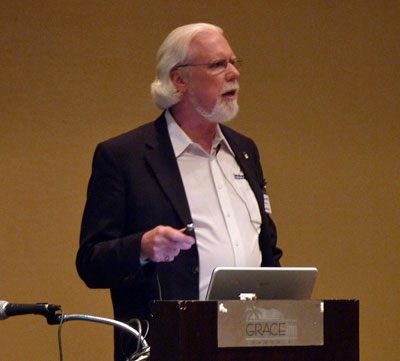
Chuck Lauer of Rocketplane Global at Space Access '10
In a presentation at the Space Access ’10 conference in Phoenix on Saturday, Chuck Lauer of Rocketplane Global provided a bit of news about the company’s efforts to develop a suborbital vehicle. That work has been on hold for the last couple of years because of a lack of funding, and most of Rocketplane’s employees have since been laid off.
Lauer announced that Rocketplane Global had signed a letter of intent with the Jacksonville Aviation Authority (JAA) to fly out of Cecil Field, a former naval air station that received a spaceport license from the FAA earlier this year. Rocketplane, he said, was the first company to reach an agreement with the JAA to operate out of Cecil Field. The flights would be coupled to the development of a tourist attraction at the spaceport that would offer a more mass-market experience, including virtual reality spaceflights, at a cost similar to typical theme park admissions.
Lauer said it would be something like the Kennedy Space Center Visitors Complex, which features a “Shuttle Launch Experience” ride, but with one key difference. “The KSC Visitors Complex is backward looking. It’s a museum dressed up with some hands-on exhibits,” he said. “This is the opposite. This is forward looking. This is the future of American spaceflight.” Cecil Field was well-positioned for something like this, since it’s the first spaceport located near a major city. Jacksonville, Lauer said, attracts about 10 million visitors a year, more than Hawaii. (While Lauer said 10 million, which is indeed higher than the 6.5 million who visited Hawaii in 2009, an economic study commissioned by the local tourism bureau estimated only 2.8 million overnight visitors in Jacksonville in 2008.) Lauer sees obvious synergies between suborbital spaceflight and terrestrial activities: “Coupling space tourism with conventional tourism is just a fundamentally sound idea.”
All this costs money, something that has been in short supply for Rocketplane. That may be changing, Lauer claimed. “We’re really close at this point” to lining up funding, he said. The challenge for the company is that it’s focus on an “all-up” development rather than the more incremental path taken by other companies—and now added to it development of terrestrial attractions—means that they need hundreds of millions of dollars. However, he said the finance community understands things like tourist attractions, and that has opened some doors for them in raising money. Lauer said they’ve been working with an investment bank on this and expect to close some funding “within a few weeks”.
Once that happens, Rocketplane plans to resume work on its XP spaceplane. He anticipates needing two to two-and-a-half years to complete development of the XP, which would be done in Oklahoma with test flights from the spaceport there; he anticipated commercial tourist flights beginning in 2013s. However, some of the spaceflight simulator rides could be ready much sooner: some could be running by the end of this year at the Future of Flight museum outside Seattle.

I see that Chuck Lauer is still managing to con people out of their money. Shame, the real NewSpace companies could really use the capital.
[…] from flights in Hawaii to, at the Space Access ’10 conference three months ago, a venture to use Florida’s Cecil Field for suborbital flights as part of a broader tourist attraction. However, time has run out for the […]
RIP Rocketplane and by all means… hope that Kenfuckey Chicken looking habitual conman snake oil used car salesperson never returns to the NewSpace industry ever again.
Chuck must of raised a few million and all that money is gone, I bet he has people after him.